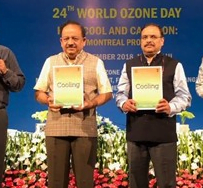India Cooling Action Plan
India Cooling Action Plan was released by the Union Minister of Environment, Forests and Climate Change. The plan is aimed at reducing emissions and providing thermal comfort to citizens.
India Cooling Action Plan
- India Cooling Action Plan provides a 20-year perspective to address the cooling requirements across various sectors and recommends ways to provide access to sustainable cooling and thermal comfort for people.
- Under the action plan, the government has planned to achieve at least 30% reductions in cooling energy requirement by improving the energy efficiency of room ACs and fans, better servicing and optimized operations in cold chains.
- The government also plans to provide training to 1 lakh service technicians to ensure optimum usage of currently installed air conditions.
- The plan also proposes Reduction of the cooling load of building sector through the fast-tracked implementation of building energy codes, adoption of thermal comfort standards, enhancing consumer awareness through eco-labelling of cooling products, push towards public transport and faster adoption of hybrid and electric vehicles.
- The plan recommends the use of climate-appropriate and energy efficient building design for construction of houses for economically weaker sections (EWS) under government affordable housing schemes.
- The plan states that plan to phase out of ozone-depleting hydrochlorofluorocarbons (HCFC) is already underway, and under the second phase, the most common refrigerant – HCFC-22 would be phased out from six major room AC brands by 2022.
- Recognize “cooling and related areas” as a thrust area of research under the national S&T Programme
Targets under India Cooling Action Plan
- Reduce cooling demand across sectors by 20% to 25% by 2037-38.
- Reduce refrigerant demand by 25% to 30% by 2037-38.
- Reduce cooling energy requirements by 25% to 40% by 2037-38.
The implementation of the India Cooling Action Plan would be overseen by an inter-ministerial Empowered Steering Committee approved by the Cabinet and Ozone Cell of the Environment Ministry act as a Cooling Secretariat to coordinate actions with other ministries.
Month: Current Affairs - March, 2019


